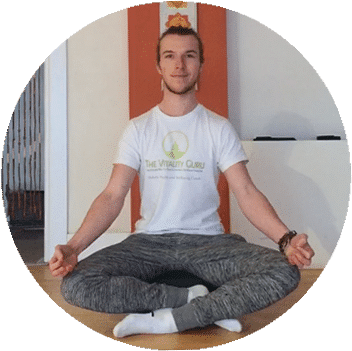

George Cook
COVID-19 Coronavirus:
Fear and Immune Health
Sunday 22nd March 2020
It seems that within only a matter of days, the COVID-19 Coronavirus pandemic has taken the world by the throat, trapping us all within our homes in a state of panic and fear – unfortunately not without reason. It’s more important now than ever that we, together, do everything that we can to take care of ourselves, of each other and of those of society we may not even know. More than ever, humanity is crying out for humanity.
However bad this truly gets for us all, it’s important that we keep ourselves centered and focused within reality. That we remain aware, alert and vigilant rather than panicked, frightened or paranoid about whats to come – as hard as that can be. When we allow ourselves to get lost in our emotions, our actions and our behaviour can become irrational, deluded and even dangerous.
The Psychological Damage of Fear
Although fear as a natural human emotion serves great purpose in keeping us alert and vigilant in the face of danger, fear when we are only in fear (as opposed to imminent threat) can be highly corrosive and damaging to our character and our psychology in many ways – It greatly suppresses our ability to think rationally, it keeps us on edge and more often than not causes our thoughts and emotions to run absolutely haywire.
On top of this, continual periods of fear and anxiety can very quickly become dominant mind-sets that we hold on to due to the fact they are vital survival instincts that we rely on for the continuation of our species. If we’re constantly in fear or anxiety about a situation, we very often remain in that state until the situation has happened.
Of course with a survival situation where it’s react or die for example, this works almost perfectly to make sure we’re as safe as we can be, however in a non-fatal situation, especially when in this modern day the vast majority of our lives are not in imminent threat or danger as opposed to our early ancestry such as mentally projected fear about a possible outcome, since we will hold onto our fear until we meet that outcome, we’re ultimately caught in a vicious cycle of paranoia until we meet our criteria – and even then, our fears become rationalised as our experiences back up that we we’re right all along.
“[Fear] can be highly corrosive and damaging to our character and our psychology in many ways – It greatly suppresses our ability to think rationally, it keeps us on edge and more often than not causes our thoughts and emotions to run absolutely haywire.”
The reason this happens is down to how fear warps our perspective and our thoughts about whatever experience we’re living at the time of the emotion arising. It causes us to be on edge, to be hyper-vigilant and to prepare for immediate attack from all angles, often causing us to fearfully interpret the motives, expressions and meanings of others behaviours for the worst. Eventually, over time if we become increasingly fearful about something and we hold on to it, we ultimately make our own lives so stressful without realising it that something in our brains – our subconscious mind – actually causes our behaviour to arise in a way so that we likely come close, or worse we even experience our deepest fears come true. Those who have experienced severe paranoia in their pasts like myself would have lived enough to know the depth of truth this holds.
Due to the way fear functions with needing a criteria to be met before we trust that we’re are safe enough to let go of our fear, you really do only have two choices when the emotion arises – you let it control you until you may eventually actually live your fears or you learn to let them go before that happens. Luckily, letting go of fear albeit unpracticed is a very simple thing to do in hindsight. It’s not the most comfortable experience at first, and it feels very unnatural but nevertheless it requires little more than some courage and determination.
The Physical Damage of Fear
Not only does fear rot away at our psychological health, fear also has a rather unpleasant effect on us physically as well. When we react in fight or flight (anxiety), most of our bodies attention becomes on survival from outside threats – such as an attacker, a wild animal or a speeding vehicle for example which appears all well and good, however in the mean time everything that was going on within our bodies is being partially ignored – mainly our immune system.
When we’re living in a state of fear or anxiety of outside threats, our body limits the amount of work that is done to save us from the inside due to the fact at this moment (of fear), it is not a vital necessity to worry about such threats. On the short term this is fine but over extended periods of time, our immune system can suffer greatly, with reports of immune disorders developing psychosomatically as a result of extended periods of fear.
On top of this, when we’re in a state of fear our cortisol levels begin to rise, along with our stress hormones such as adreneline. These stress hormones over time not only weaken our ability to fight off infections and disease, but furthermore excessive cortisol can have a lasting and damaging effect on our brain tissues and connectivity in many ways from increasing the levels of grey to white matter and even effecting the size and connectivity of our amygdala; the part of our brain responsible for the processing of memory, decision-making and emotional responses.
How to Let Go of Fear
Like I noted early, the release of fear is actually a rather straightforward process, especially on paper. To carry out, it requires a little more effort but all in all, it’s still relatively simple.
To let go of fear, you simple have to become aware of your fear as opposed to possessed-by or attached to it.
The difference; feeling fear arise and knowing all is okay versus getting shaky, panicky and thinking either you or your world may be on the very brink of collapse / death this very instant.
The tool you can use to develop this habit of letting go (feeling and knowing all is okay) versus getting fully wrapped up and possessed by it is what’s known as mindfulness – the fancy way of saying to practice self awareness through a simple deep breathing meditation.
That’s really all their is too it – I know, it seems stupidly simple and if so, why doesn’t every psychiatrist know this – well believe it or not, most of them do however their specifications of treatment don’t involve the option of meditative practice, nor is meditation an accepted form of medical treatment – rather it’s kept as complimentary or an alternative option – unless of course your psychiatrist is also a naturopathic doctor.
To help you get started, I’ve recorded a simple, short, guided mindfulness meditation to help you get the gist and get a feel for what you’re doing. Try it first off a couple of times to get an idea of what mindfulness is and then with some practice, when your fear arises, it will be clear what to do!


